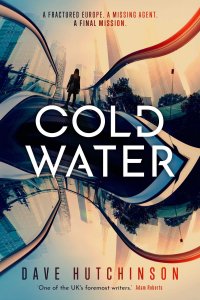Paul Di Filippo Reviews Cold Water by Dave Hutchinson
 Cold Water, Dave Hutchinson (Solaris 978-1786187222, trade paperback, 464pp, $16.99) November 2022.
Cold Water, Dave Hutchinson (Solaris 978-1786187222, trade paperback, 464pp, $16.99) November 2022.
Having completed his marvelous main sequence of Fractured Europe books with a fourth installment, Europe at Dawn, in 2018 (you can read my review of three-quarters of the series here), Hutchinson now offers a pendant volume, starring a new lead. But the tale is in no way overly reliant upon, inferior to, or less fully developed and satisfying than the quartet. Veteran readers and newbies alike will be able equally to savor this wild, always surprising caper-cum-spy novel, a blend of Donald Westlake and John Le Carré.
A lot of the charm and plot engine of this book derives from our heroine, one Carey Tews. (I should mention here that a subsidiary plot involves a second protagonist, an Estonian cop named Krista. While Krista is neatly conceived and embodied, her saga, eventually intersecting with Carey’s, is less dominant, and Krista herself receives less backstory shading that might have made her account and nature a full rival to Carey. So I’ll focus on Carey’s through line.)
The world has, within the past decade or so, emerged from a massive pandemic much worse than Covid, for in Europe alone over fifty million people have died. This fact only contributes to the deracination of the region, which has splintered into “an everchanging patchwork of nations and states and republics and margravates and sanjaks and polities and anarchies… Through it all passed Les Coureurs, delivering mail and more valuable items across Europe’s bewildering jigsaw of borders… [They] were everywhere, the most non-state of non-state actors.”
Carey was an expert, highly regarded coureur, until she retired. But now she has been summoned into action once more by Coureur Central, who hail her to Gliwice, Poland. It appears that her ex-boyfriend, Maksim, also in the biz, has been running an enigmatic off-the-books racket which culminated in his death by car accident. The half-understood scam has already destabilized and alarmed several factions in Europe, including the highly brutal and suspicious Russians, and Carey is tasked with learning everything she can about Maksim’s doings and reporting back. She reluctantly takes the job, and from here, things start to get really weird.
Is Maksim dead or not? Did he have anything to do with Tallinn, Estonia, suffering a major electrical blackout, and with Krista’s dead father undergoing a posthumous scandal? How does Maksim’s path intersect with the Community, a literal pocket universe congruent with Europe? (You have to love that the Community was the Borgesian creation of cartographers.) And is it possible that the Community is not the only pocket universe around?
Carey eventually has to have help, so she assembles a team of experts to handle all the details, and it’s here that Hutchinson has a blast with the typical caper tropes. First onboard is Anatoly, an old acquaintance, a dour Russian jack-of-all-spycraft trades. Then arrives a trio of teenage Polish freelancers: computer whiz Magda; expert counterfeiter of documents Boksi; and a procurer of gadgets and other goods named Romek.
Soon Carey and crew are following leads all across Europe, while also being surveilled in turn by any number of interested parties. There is a refreshing lack of gunplay and violence in the book, where, instead, all the moves and countermoves more resemble a cerebral chess match. The sardonic dialogue crackles, and we inhabit Carey’s wry and cynical take on developments.
Finally the mystery of Maksim and his schemes reaches an unpredictable but totally resonant ending, and we applaud as Carey exits, stage-left, “a tall Texan women of a certain age with a temper” and with some spoils of the hunt firmly and illicitly in her pocket.
Besides weaving adroitly a dozen plot threads, Hutchinson makes his world very tangible and vivid, both on the microcosmic and macrocosmic levels.
In Amsterdam, tourism was slowly recovering, but out in the countryside everything seemed to be sleeping under a magic spell, flat fields and lowering skies and hardly any people to be seen. As the train rolled north, she saw buildings in the distance which seemed to reflect the light with a flat grey sheen, entire villages mothballed under layers of spray-on plastic, waiting for the people to return. Some of the fields were neatly cultivated, but many of them were growing wild, and a lot of the canals and drains that divided the landscape looked dangerously close to overflowing their banks. Looking at that, you could see just how much institutional knowledge the country had lost, how close the infrastructure still was to collapse.
Hutchinson is one of those SF writers not currently dabbling in trendy themes and styles, flavor-of-the-month causes or preachy messages. His work is solidly constructed, slightly subversive and supremely speculative—in other words, possessed of most of the hallmarks of great SF. Although he should be on all the award ballots, but is not, we cannot lament, but just bask instead in our Secret Knowledge.
 While you are here, please take a moment to support Locus with a one-time or recurring donation. We rely on reader donations to keep the magazine and site going, and would like to keep the site paywall free, but WE NEED YOUR FINANCIAL SUPPORT to continue quality coverage of the science fiction and fantasy field.
While you are here, please take a moment to support Locus with a one-time or recurring donation. We rely on reader donations to keep the magazine and site going, and would like to keep the site paywall free, but WE NEED YOUR FINANCIAL SUPPORT to continue quality coverage of the science fiction and fantasy field.
©Locus Magazine. Copyrighted material may not be republished without permission of LSFF.






